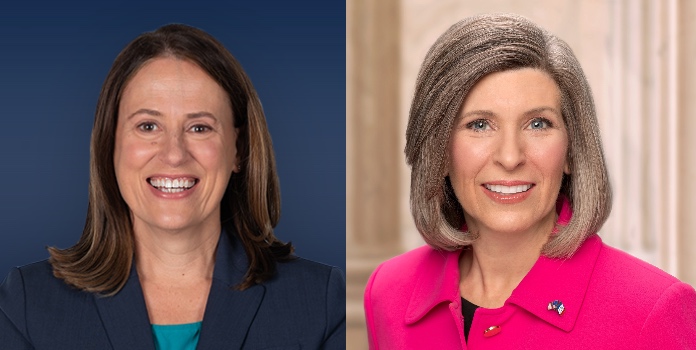Iowans haven’t voted a sitting U.S. senator out of office since 1984, but a third poll taken since the June 2 primary shows Senator Joni Ernst slightly trailing Democratic nominee Theresa Greenfield.
One poll might be dismissed as a fluke. Two polls might be explained away by the fact that groups supporting Greenfield commissioned the surveys. But Selzer & Co, which conducts the Iowa Poll for the Des Moines Register and Mediacom, has no dog in this fight.
Selzer interviewed 674 “likely voters” between June 7 and 10 and found 46 percent would vote for Greenfield and 43 percent for Ernst if the election were held today. That’s within the margin of error of plus or minus 3.8 percent.
Among a larger sample of 801 adults, 49 percent approve of the job Ernst is doing, 39 percent disapprove, and 13 percent are unsure. Also among that larger group, 45 percent have a mostly or very favorable impression of Ernst, 40 percent mostly or very unfavorable, and 15 percent are unsure. Greenfield’s favorable numbers were 42 percent, with 20 percent expressing an unfavorable view and 39 percent unsure.
As Bleeding Heartland discussed here, both sides are spending money trying to define Greenfield with a broader electorate. The challenger is much less well-known than Ernst, which could mean she has room to grow her support, or it could mean a barrage of Republican attack ads will bring down her numbers.
David Kochel, a leading spin doctor for Ernst since her first Senate campaign, expressed confidence after the Selzer poll was released.
Coming off the primary victory bounce, this will be @GreenfieldIowa’s best poll. All downhill from here as voters learn about her business record and phony biography. #IASen https://t.co/xw2ZFKCoMo
— David Kochel (@ddkochel) June 13, 2020
I countered that an incumbent with re-elect numbers in the low 40s is not in a strong position. Furthermore, while Republicans will no doubt try to make this race a “choice” election, it’s more likely to shape up as a referendum on Ernst and on President Donald Trump, to whom the senator has been unfailingly loyal.
Kochel had an answer for that too: Brianne Pfannenstiel’s report for the Des Moines Register didn’t mention some $7 million to $8 million outside groups have already spent on television or internet ads attacking Ernst, while Greenfield’s negatives have not been explored. Plus, Kochel believes, “Incumbents needing to be over 50% is a relic observation from the 1980’s.”
We shall see. A few years ago I didn’t think Iowa’s 2020 Senate race would be competitive enough for outside groups to get involved. Even a year ago, WHO-TV’s political director Dave Price observed, “some Iowa political insiders questioned whether this race could be competitive. Conversations are different now.”
Democrats should not be overconfident about the Senate race. It’s hard to guess the structure of the electorate five months in advance, especially in light of the COVID-19 pandemic, so any poll of “likely voters” should be viewed a bit skeptically. The same goes for results among sub-groups of a sample, which always have a higher margin of error than the survey as a whole. But for what it’s worth, Pfannenstiel highlighted strengths for each candidate:
Ernst has strong backing from evangelicals (67 percent to 22 percent), Iowans living in rural areas (56 percent to 32 percent), men (53 percent to 37 percent), and white men with no college degree (59 percent to 30 percent).
For her part, Greenfield has clear leads among voters with no religious affiliation (71 percent to 19 percent), those living in cities (55 percent to 34 percent), women (54 percent to 34 percent), and white women with no college degree (60 percent to 29 percent).
I expect national forecasters will soon move Iowa’s Senate race from “lean Republican” to the toss-up column.
P.S.–The Register’s longtime political columnist David Yepsen, who now hosts the “Iowa Press” public affairs program on Iowa PBS, commented that we need numbers for Joe Biden and Trump in Iowa to get a “clearer picture” of the Senate race. On the other hand, he noted that Tom Harkin defeated GOP incumbent Roger Jepsen in 1984.
Ticket-splitting was more common in those days. But for the history buffs: Harkin took 55.5 percent of the vote in his first Senate victory, to 43.7 percent for Jepsen. In that same election, President Ronald Reagan gained 53.3 percent of the vote in Iowa, to 45.9 percent for Democratic challenger Walter Mondale.
Yepsen also recalled that Democrat Dick Clark beat Senator Jack Miller in 1972, even as President Richard Nixon easily won Iowa’s electoral votes. Clark won the Senate seat by a 55.1 percent to 44.1 percent margin, while Nixon carried Iowa by 57.6 percent to 40.5 percent for George McGovern.

